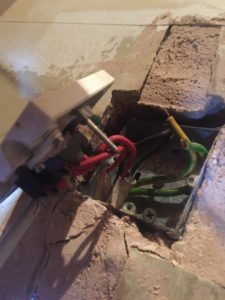For the past 38 years we have provided electrical services across Hertfordshire and London. As I’m sure you can imagine, we have encountered some electrical horrors and ver y near misses over the years! This could be due to incompetent tradesman, electrical DIY, or faulty electrics.
y near misses over the years! This could be due to incompetent tradesman, electrical DIY, or faulty electrics.
Our most recent discovery was this socket outlet in a house in Kensington. The tradesman who installed the fridge had left the socket outlet in this condition from over 4 years ago! This was highly concerning for our engineer to discover as electrics like this can be fatal. There was risk of electric shock to the resident, but also electrical sockets like this could’ve caused the appliance to become very hot and potentially explode!
Electrical Safety Tips
Electricity was a brilliant discovery for the human race, however its important to be cautious with electricity as it can cause fatal injuries if mishandled. We recommend the following tips to optimise electrical safety in your home:
- Always use registered electricians. NICEIC, Elecsa, and NAPIT are UK registering bodies for electrical contractors. They will carry out thorough audits to assess the electrician is competent and works to the highest standard of safety and quality. The electrician will also have to work to the latest British safety Standards. Electrical Safety First have a register in which you can find a local, registered electrician HERE.
- Do not carry out electrical DIY! According to Electrical Safety First, DIY causes half of electric shocks in UK households. The safety factor is a major concern, therefore its best to always use a registered electrician to carry out the works. Many DIY electrical incidences are caused by cutting through a power lead, not turning off electrical devices before working on them, and drilling into wiring. Always seek advice from a professional, and if you’re not sure then do not carry out the DIY works.
- Use Part P registered electricians in St Albans. As mentioned above, if you use a registered electrician they are likely to also meet Part P requirements. Part P is a building regulation which ensures the electrical installations within dwellings are safe. Majority of electrical works within a dwelling will be Part P affected. Therefore the works needs to be notified and inspected by a building control body to ensure they meet building regulations.
- Have an Electrical Installation Condition Report (EICR) carried out on your property. The EICR will highlight any internal wiring defects, as well as visual defects to your sockets or wiring which could cause a fire.
- Have a common sense approach with electricity. Do not overload sockets, do not leave electrical items charging while unattended, and contact an electrician if you notice any visual defects with your sockets or wires.
Its important to treat electricity with the utmost respect. Sometimes you can follow all the above advice and an electrical incident could still occur. However its important to eliminate the risk as much as possible.
Please do not hesitate to contact us HERE for all your electrical needs or for further electrical advice.
